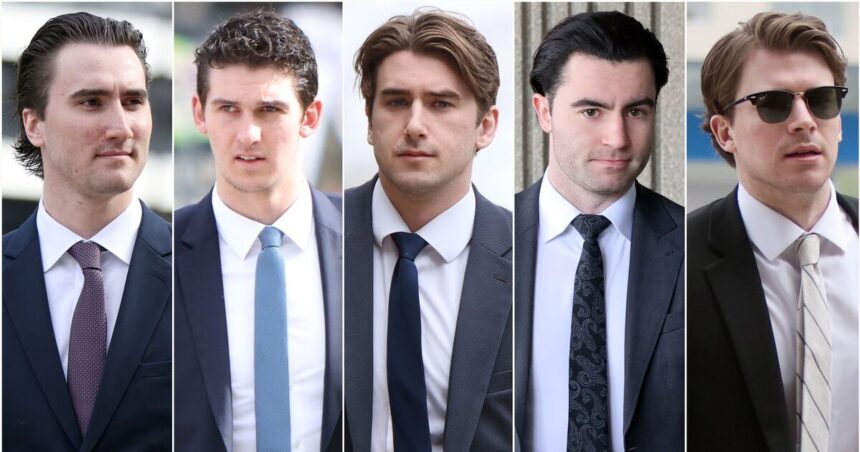In a Halifax courtroom yesterday, former teammates of five men charged with sexual assault provided testimony that painted contrasting pictures of the complainant’s demeanor during a 2018 hockey gala. The high-profile case, which has sent ripples through Canada’s junior hockey community, centers around allegations stemming from an incident at a hotel following a sports awards ceremony.
Three witnesses who played with the accused on the same junior hockey team testified they observed the complainant at the hotel bar that evening, describing her as “happy” and showing no signs of distress. One former player told the court he saw the woman smiling and engaging in conversation with several individuals before leaving with one of the defendants.
“I wasn’t worried about her in any way,” testified one ex-teammate, who cannot be named due to a publication ban. “She seemed completely fine, like anyone else enjoying the evening.”
This testimony appears to support the defense’s position that any sexual activity was consensual. The five former junior hockey players, now in their mid-twenties, each face charges of sexual assault and sexual assault causing bodily harm following allegations they participated in a group sexual assault in a hotel room.
However, Crown prosecutors challenged these characterizations during cross-examination, questioning the witnesses’ ability to accurately assess the complainant’s state given the crowded venue and the consumption of alcohol throughout the evening. The prosecution presented evidence suggesting the complainant had been served multiple drinks before the alleged assault occurred.
“Is it possible that your observations were limited by your own inebriated state?” asked the Crown prosecutor, highlighting inconsistencies between the witnesses’ current testimony and their initial police statements from 2018.
The case has reignited discussions about consent and alcohol in sexual assault cases, as well as scrutiny of sports culture in Canada. Advocates for sexual assault survivors have gathered outside the courthouse daily, while the hockey community watches the proceedings closely.
Earlier in the trial, the complainant testified she had limited memory of the evening but had not consented to sexual activity with multiple partners. Medical evidence presented by the prosecution documented injuries consistent with forced sexual activity.
The case represents one of several high-profile sexual assault allegations that have emerged in Canadian sports in recent years, prompting calls for better education and accountability within sporting organizations across the country.
Legal experts following the case note the prosecution faces challenges in cases involving alcohol and memory issues, but emphasize that Canadian courts have evolved in their understanding of consent in recent years. “The key question isn’t just whether consent was explicitly refused, but whether affirmative, ongoing consent was clearly established,” said a legal analyst following the proceedings.
The trial continues next week with additional testimony expected from character witnesses and expert testimony regarding the effects of alcohol on memory and consent. As this case unfolds within our judicial system, Canadians are left to consider: what responsibility do sporting organizations bear in fostering cultures that truly respect boundaries and consent?

























